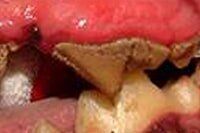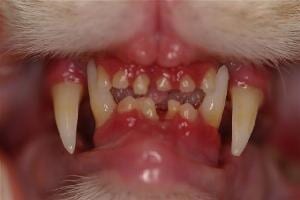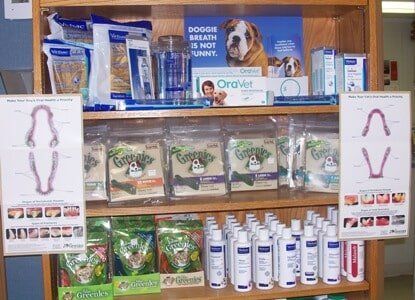Canine and Feline Veterinary Services in Belleville, IL
Belleville Animal Clinic Proudly Provides Treatment For:



Vaccinations
Wellness Health Screen
Research shows more than 10 percent of pets brought to veterinary clinics for checkups have some form of underlying disease or abnormality (Veterinary Economics, April 2001). Many of these pets have a normal physical examination and their abnormalities would go undetected without a Wellness Health Screen.
The process of disease development can be slow and insidious. When an organ system starts to fail, the organ will try to compensate to bring function back to normal. Over time, this compensation mechanism will fail and the pet will become very ill. Once the pet is in organ failure, your treatment options are limited and the prognosis is poor. However, our veterinary clinic is capable of performing a simple blood test that will check your pet's liver, kidneys, electrolytes, minerals, thyroid level, heartworm test, and blood sugar. The test can also alert us to infection, inflammatory disease and anemia.
Early Detection of disease is key. Once a problem has been identified, appropriate treatment recommendations can be made. Often times, a simple change in diet is all that is needed to avoid major health problems in your pet.
The Wellness Health Screen is a blood test, and we can usually have results by the next business day.
Call the clinic at 233-5720 for more information
The process of disease development can be slow and insidious. When an organ system starts to fail, the organ will try to compensate to bring function back to normal. Over time, this compensation mechanism will fail and the pet will become very ill. Once the pet is in organ failure, your treatment options are limited and the prognosis is poor. However, our veterinary clinic is capable of performing a simple blood test that will check your pet's liver, kidneys, electrolytes, minerals, thyroid level, heartworm test, and blood sugar. The test can also alert us to infection, inflammatory disease and anemia.
Early Detection of disease is key. Once a problem has been identified, appropriate treatment recommendations can be made. Often times, a simple change in diet is all that is needed to avoid major health problems in your pet.
The Wellness Health Screen is a blood test, and we can usually have results by the next business day.
Call the clinic at 233-5720 for more information
General Surgery
Your pet's comfort and safety are our biggest concerns!
Package prices are available for affordable spays, neuters and dentals. Estimates can be given for other procedures.
We are well equipped to perform all routine surgeries for your pet. We also perform a wide range of non-routine soft tissue and orthopedic surgeries. For pets that will be anesthetized during their stay with us, please withhold food after 10 o'clock the night before. Water throughout the night is fine. Our Doctors use the safest anesthesia protocols for your pet, heated surgery tables for greater comfort; IV fluids; advanced sterilization techniques; ECG and oxygen saturations monitors; intensive after surgery care and full blood testing.
To ensure your pet has a safe experience, we recommend pre-anesthetic blood work prior to surgery consisting of the following:
Pre-Anesthetic Chemistry Panel - tells us information about major organ function which will assist us in determining the most appropriate medications to use.
Complete Blood Count - this details information about red blood cell count and white blood count which can indicate infection, inflammation, anemia or other potential anesthetic risks.
The top 4 reasons to test your pet before anesthesia:
You deserve peace of mind. Testing can significantly reduce medical risk and ensure your pet's health and safety.
Pets can't tell us when they don't feel well. A healthy-appearing pet may be hiding symptoms of a disease or ailment. For example, a pet can lose up to 75% of kidney function before showing any visible signs of illness. Testing helps us evaluate your pet's health up front, so we can avoid problems related to anesthesia.
Testing can reduce the risk and consequences. If pre-anesthetic results are within normal ranges, we can proceed with confidence, knowing that anesthetic risk is minimized. On the other hand, if results are not within the normal ranges, we can alter the anesthetic procedure, or take other precautions to safeguard your pet's health and reduce the risk of potential complications.
Testing can help protect your pet's future health. These tests provide baseline levels for your pet and become part of his or her medical record for future references
Package prices are available for affordable spays, neuters and dentals. Estimates can be given for other procedures.
We are well equipped to perform all routine surgeries for your pet. We also perform a wide range of non-routine soft tissue and orthopedic surgeries. For pets that will be anesthetized during their stay with us, please withhold food after 10 o'clock the night before. Water throughout the night is fine. Our Doctors use the safest anesthesia protocols for your pet, heated surgery tables for greater comfort; IV fluids; advanced sterilization techniques; ECG and oxygen saturations monitors; intensive after surgery care and full blood testing.
To ensure your pet has a safe experience, we recommend pre-anesthetic blood work prior to surgery consisting of the following:
Pre-Anesthetic Chemistry Panel - tells us information about major organ function which will assist us in determining the most appropriate medications to use.
Complete Blood Count - this details information about red blood cell count and white blood count which can indicate infection, inflammation, anemia or other potential anesthetic risks.
The top 4 reasons to test your pet before anesthesia:
You deserve peace of mind. Testing can significantly reduce medical risk and ensure your pet's health and safety.
Pets can't tell us when they don't feel well. A healthy-appearing pet may be hiding symptoms of a disease or ailment. For example, a pet can lose up to 75% of kidney function before showing any visible signs of illness. Testing helps us evaluate your pet's health up front, so we can avoid problems related to anesthesia.
Testing can reduce the risk and consequences. If pre-anesthetic results are within normal ranges, we can proceed with confidence, knowing that anesthetic risk is minimized. On the other hand, if results are not within the normal ranges, we can alter the anesthetic procedure, or take other precautions to safeguard your pet's health and reduce the risk of potential complications.
Testing can help protect your pet's future health. These tests provide baseline levels for your pet and become part of his or her medical record for future references
General Dentistry
- Why is it important to examine your pet's mouth?
Dental calculus (tartar) is composed of various mineral salts, organic material and food particles. In the early stages of accumulation, the material is soft (plaque), but it later hardens and adhere to the teeth. Continual accumulation causes inflammation of the gums and eventual recession of the gums and loss of teeth. The breath becomes very odorous and the mouth becomes a dangerous source of infection.
Untreated tooth and gum disease may allow bacteria to enter the bloodstream and cause damage to the valves of the heart.
- How do you protect your pet from a dirty mouth?
Feed hard or coarse foods.
Provide rawhide, hard rubber or nylon chew toys or hard treat foods. Remember that the teat foods are a source of calories and may lead to obesity if too many are given.
Brush your pet's teeth periodically. Your veterinarian can provide a special enzymatic toothpaste developed for the teeth of cats and dogs. Abrasive dental cleaning pads are also helpful in cleaning the teeth. Water and baking soda can be used with a soft toothbrush but are less effective than tooth-paste developed for animals.
Regular professional cleaning by your veterinarian is the most effective way to ensure good dental health for your pet.
Dental calculus (tartar) is composed of various mineral salts, organic material and food particles. In the early stages of accumulation, the material is soft (plaque), but it later hardens and adhere to the teeth. Continual accumulation causes inflammation of the gums and eventual recession of the gums and loss of teeth. The breath becomes very odorous and the mouth becomes a dangerous source of infection.
Untreated tooth and gum disease may allow bacteria to enter the bloodstream and cause damage to the valves of the heart.
- How do you protect your pet from a dirty mouth?
Feed hard or coarse foods.
Provide rawhide, hard rubber or nylon chew toys or hard treat foods. Remember that the teat foods are a source of calories and may lead to obesity if too many are given.
Brush your pet's teeth periodically. Your veterinarian can provide a special enzymatic toothpaste developed for the teeth of cats and dogs. Abrasive dental cleaning pads are also helpful in cleaning the teeth. Water and baking soda can be used with a soft toothbrush but are less effective than tooth-paste developed for animals.
Regular professional cleaning by your veterinarian is the most effective way to ensure good dental health for your pet.
Hospitalization
Digital Radiology
Laboratory Services
Parasite Control
Intestinal Parasites
De-worming is recommended for all puppies and kittens. Puppies and kittens readily obtain intestinal parasites from their mothers or other animals. All puppies and kittens should be de-wormed several times.
Roundworm, Hookworm, Whipworms are common intestinal parasites. Adult worms produce eggs that are passed into the stool and are visible only under the microscope when a stool sample is examined. These worms can cause serious damage to the intestinal tract. Occasionally a very young puppy or kitten may have young adult worms that are not yet producing eggs, thus a fecal exam may be read as "negative" when the animal truly does have worms. In this case, we would recommend a repeat fecal exam a few weeks later. You may see your puppy or kitten pass adult worms in its stool or via vomiting- bring these in for identification. Yearly stool examinations are recommended for older dogs and cats.
Coccidia are parasites that can only be seen microscopically. They can cause serious diarrhea and are readily transmitted from one pet to another. They require a medication different from that used for roundworm, hookworm, and whipworms.
Tapeworm are contracted by swallowing fleas or from eating rodents. They are most often seen by you at home, in the stool or on the pet's fur or bedding. They look like small off-white rice segments. As long as your puppy is exposed to fleas, he can become re-infested. Tapeworms do little physical damage, but are treated for aesthetic reasons.
Heartworm Disease in Dogs
Heartworm disease is a serious year-round problem in this area. Larva of the parasitic worm are carried by mosquitoes and are transmitted to a dog when the mosquito feeds. The larvae travel to the dog's heart, mature, mate, and produce microfilaria. Heartworms cause extensive damage to the lungs, liver, heart and kidneys of the infected dogs. Heartworm disease can be treated, but not always successfully. We strongly recommend that all dogs in this area be placed on preventative medication. Puppies may start as early as 6 weeks of age. A monthly tablet or chew, called Heartgard, is available. Dogs should be kept on preventative year-round. Any dog over 6 months of age that has not been on preventative must be tested for the presence of microfilariae prior to starting preventative or doing any surgical procedure such as a spay or castration.
De-worming is recommended for all puppies and kittens. Puppies and kittens readily obtain intestinal parasites from their mothers or other animals. All puppies and kittens should be de-wormed several times.
Roundworm, Hookworm, Whipworms are common intestinal parasites. Adult worms produce eggs that are passed into the stool and are visible only under the microscope when a stool sample is examined. These worms can cause serious damage to the intestinal tract. Occasionally a very young puppy or kitten may have young adult worms that are not yet producing eggs, thus a fecal exam may be read as "negative" when the animal truly does have worms. In this case, we would recommend a repeat fecal exam a few weeks later. You may see your puppy or kitten pass adult worms in its stool or via vomiting- bring these in for identification. Yearly stool examinations are recommended for older dogs and cats.
Coccidia are parasites that can only be seen microscopically. They can cause serious diarrhea and are readily transmitted from one pet to another. They require a medication different from that used for roundworm, hookworm, and whipworms.
Tapeworm are contracted by swallowing fleas or from eating rodents. They are most often seen by you at home, in the stool or on the pet's fur or bedding. They look like small off-white rice segments. As long as your puppy is exposed to fleas, he can become re-infested. Tapeworms do little physical damage, but are treated for aesthetic reasons.
Heartworm Disease in Dogs
Heartworm disease is a serious year-round problem in this area. Larva of the parasitic worm are carried by mosquitoes and are transmitted to a dog when the mosquito feeds. The larvae travel to the dog's heart, mature, mate, and produce microfilaria. Heartworms cause extensive damage to the lungs, liver, heart and kidneys of the infected dogs. Heartworm disease can be treated, but not always successfully. We strongly recommend that all dogs in this area be placed on preventative medication. Puppies may start as early as 6 weeks of age. A monthly tablet or chew, called Heartgard, is available. Dogs should be kept on preventative year-round. Any dog over 6 months of age that has not been on preventative must be tested for the presence of microfilariae prior to starting preventative or doing any surgical procedure such as a spay or castration.
Microchip Identification
Microchips have helped reunite thousands of pets with their families. A tiny microchip can be implanted between the shoulder blades of your dog or cat as a permanent means of identification. The procedure is similar to giving a vaccination and does not require sedation. The Belleville Area Humane Society, St. Clair County Animal Control, and Madison County Humane Society all have the capacity to scan lost dogs and cats for these microchips. An identification tag or microchip could save your pet's life!
Belleville Animal Clinic uses Save This Life international microchips! Save This Life international microchip has the fastest recovery time. Your pets microchip identification number can be put into Google search. Your pets microchip information will come up in Google linked to Save This Life (your personal information is not shown. They will be able to bring up your pets information (your personal information is not show). The good Samaritan who has found you pet can then send you a private text or email through Save This Life to let you know your pet has been found. Belleville Animal Clinic will do all the registering with Save This Life for you.
Any microchip brand can be registered with Save This Life recovery system, read more here at SaveThisLIfe.com
Belleville Animal Clinic uses Save This Life international microchips! Save This Life international microchip has the fastest recovery time. Your pets microchip identification number can be put into Google search. Your pets microchip information will come up in Google linked to Save This Life (your personal information is not shown. They will be able to bring up your pets information (your personal information is not show). The good Samaritan who has found you pet can then send you a private text or email through Save This Life to let you know your pet has been found. Belleville Animal Clinic will do all the registering with Save This Life for you.
Any microchip brand can be registered with Save This Life recovery system, read more here at SaveThisLIfe.com
Allergy Management
Arthritis Management
Dietary Management
Diabetes Management
Euthanasia and Cremation
To euthanize, or put a pet 'to sleep,' is a difficult and very personal decision for pet owners. All of us at Belleville Animal Clinic understand this, and most of us have personally experienced this with one or more of our own pets over the years.
Having a pet brings great joy to most families, but the fact is that we most-often outlive our pets. The time may come when your pet's quality of life is such that the most kind and loving thing that you can do for them is to put them to rest in a loving and humane fashion.
Once a decision has been reached to euthanize a pet, an appointment is made with a doctor. We understand the difficulty of making a decision such as this, and we accommodate clients on short notice in regard to this matter. You may, or may not, choose to stay with your pet. It is entirely up to you. We do recommend that the paperwork and payment transaction be handled prior to the euthanasia; this allows you to stay with your pet as long as you wish and to leave the office directly from the exam room without having to wait in the reception area after an emotional goodbye.
We offer cremation services, both separate and mass cremation service. We offer a small array of urn choices for your loved ones remains.
Having a pet brings great joy to most families, but the fact is that we most-often outlive our pets. The time may come when your pet's quality of life is such that the most kind and loving thing that you can do for them is to put them to rest in a loving and humane fashion.
Once a decision has been reached to euthanize a pet, an appointment is made with a doctor. We understand the difficulty of making a decision such as this, and we accommodate clients on short notice in regard to this matter. You may, or may not, choose to stay with your pet. It is entirely up to you. We do recommend that the paperwork and payment transaction be handled prior to the euthanasia; this allows you to stay with your pet as long as you wish and to leave the office directly from the exam room without having to wait in the reception area after an emotional goodbye.
We offer cremation services, both separate and mass cremation service. We offer a small array of urn choices for your loved ones remains.








